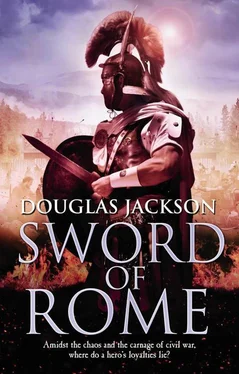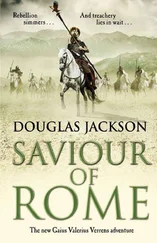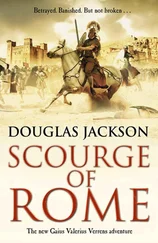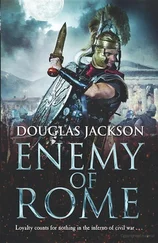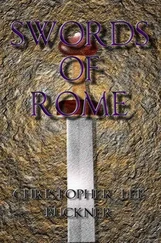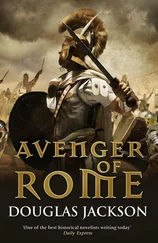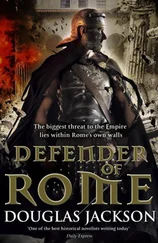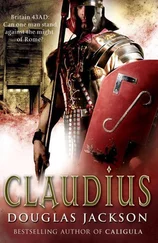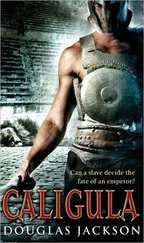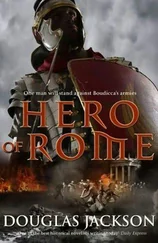Douglas Jackson - Sword of Rome
Здесь есть возможность читать онлайн «Douglas Jackson - Sword of Rome» весь текст электронной книги совершенно бесплатно (целиком полную версию без сокращений). В некоторых случаях можно слушать аудио, скачать через торрент в формате fb2 и присутствует краткое содержание. Жанр: Исторические приключения, на английском языке. Описание произведения, (предисловие) а так же отзывы посетителей доступны на портале библиотеки ЛибКат.
- Название:Sword of Rome
- Автор:
- Жанр:
- Год:неизвестен
- ISBN:нет данных
- Рейтинг книги:5 / 5. Голосов: 1
-
Избранное:Добавить в избранное
- Отзывы:
-
Ваша оценка:
- 100
- 1
- 2
- 3
- 4
- 5
Sword of Rome: краткое содержание, описание и аннотация
Предлагаем к чтению аннотацию, описание, краткое содержание или предисловие (зависит от того, что написал сам автор книги «Sword of Rome»). Если вы не нашли необходимую информацию о книге — напишите в комментариях, мы постараемся отыскать её.
Sword of Rome — читать онлайн бесплатно полную книгу (весь текст) целиком
Ниже представлен текст книги, разбитый по страницам. Система сохранения места последней прочитанной страницы, позволяет с удобством читать онлайн бесплатно книгу «Sword of Rome», без необходимости каждый раз заново искать на чём Вы остановились. Поставьте закладку, и сможете в любой момент перейти на страницу, на которой закончили чтение.
Интервал:
Закладка:
Douglas Jackson
Sword of Rome
The story I now commence is rich in vicissitudes, grim with warfare, torn by civil strife, a tale of horror even during times of peace.
Cornelius Tacitus, The Histories
I
Southern Gaul, May, AD 68
She had died protecting her child; that seemed obvious. A tiny hand, the fingers already turning blue in the stifling heat, lay palm upwards just visible beneath the edge of the shabby grey cloak that covered her body. The raven hair fluttering in the soft breeze was still lustrous where it hadn’t been clotted by blood and brain matter from the terrible wound in her skull. Gaius Valerius Verrens was thankful he couldn’t see the mother’s face. He raised his eyes to the crows and buzzards circling in improbably blue skies, their cries of irritation at being disturbed from the feast an unlikely lament to the fallen. With a feeling of weary resignation he remounted the big roan and surveyed the swollen clusters of dead that lay like stranded maggots across the field of half-grown corn between the woods and the olive grove.
‘They would have hidden in the trees.’ He frowned. ‘But whoever killed them must have flushed them out and then ridden them down when they tried to flee.’
‘What does it matter?’ The speaker’s voice managed to combine impatience and arrogance in equal measure. ‘They’re just a few barbarian peasants. We are wasting time.’
Valerius turned to consider his companion. It exasperated him that Marcus Salvius Otho could be so irritating, and at the same time so difficult not to like. Only a few years older and of the same senatorial rank, the man insisted on treating him as if he were a junior tribune on his first campaign. A rich man on a rich man’s horse, Otho had curly dark hair and a face that had never known hunger. Heavy brows arched above liquid, almost feminine eyes; sensitive eyes that softened a nose like a ship’s ram and an overweening sense of his own importance. The cavalry escort, a troop of mounted archers from some wild tribe of the Vascones mountains in the northernmost region of Hispania, rested their horses in the shade of the nearby olive trees. They had been in the saddle for eighteen days since leaving Carthago Nova, the last few through the chattel-stripped, fear-ridden landscape of a failed rebellion. Exhaustion and hunger were written stark in the deep lines on their faces. Valerius kept his voice low enough not to be overheard.
‘It matters because, judging by the hoofprints, there must have been fifty of them, which means they outnumber us two to one. If they’re a marauding band of surviving rebels, they would think twice about attacking regular cavalry …’
‘Those rebels, as you call them, are our allies,’ Otho sniffed. Valerius felt a familiar twinge of conscience at the reminder that he was himself a rebel. True, Nero had earned his enmity by his treatment of Valerius’s former commander, Corbulo, General of the East, but a gut-wrenching, very Roman part of him agonized over conspiring against a man born with a divine right to rule. He shook the thought from his mind. Nero had sown the seeds of his own destruction by his ill use of the army, the Senate and the people. The fruits of that sowing had become apparent two months earlier when the Gaulish aristocrat Gaius Julius Vindex had raised the southern tribes against the Emperor. Somehow, Vindex, the rustic senator, had convinced Otho’s patrician patron, Servius Sulpicius Galba, governor of Hispania Tarraconensis, to support him. But Galba had been too slow to act, leaving Vindex’s ill-disciplined and badly led rebel army to suffer inevitable defeat against the elite Rhenus legions the Emperor sent against him. Now Galba, whose ambitions for the purple remained undiminished, was back in Hispania, and he had dispatched Otho to Rome in a bid to persuade certain powerful men that change was necessary. If Otho succeeded, he was confident the ageing Galba would name him his heir. If he failed, all he could look forward to was a painful end. It was Valerius’s job to get him there.
Valerius shrugged. ‘Since the defeat at Vesontio they’re hunted men with swords in their hands, bellies to fill and nothing to lose. If they sense weakness, they will attack, allies or not. I’d guess we’re too strong for them, but’ — he pointed to the dead woman — ‘if these people were killed by auxiliary cavalry we have a different problem. The legions which destroyed Vindex are loyal to the Emperor and still quartered at Lugdunum, less than fifty miles north. If they take us, the best you can hope for is to be strung up from the nearest tree.’
Otho swatted at the flies plaguing his horse. ‘Then we must avoid-’
‘Shit.’ Valerius reacted instantly to a howling shriek that split the silence like an executioner’s sword as thirty horsemen burst from the cover of the trees on the far side of the field. He spun the roan and dragged Otho’s mount by the bridle back into the shadow of the olive grove.
‘Form line,’ he roared. ‘Serpentius? With me in the centre. Two men to guard the governor.’ The field was heat-baked, as flat as a legionary parade ground and three hundred paces wide. By now the enemy horsemen — Batavian auxiliaries, judging by their war gear — were a quarter of the way across, but Valerius took the time to issue precise orders. He rapped out the commands, roaming the line as he shouted each word in their faces. ‘Swords only.’ The long, razor-edged spathae hissed from their sheaths. ‘Straight to the charge. Stay tight with me. We hit them once and we hit them hard. Leave them screaming and bloody then circle back to cover the governor. Understand?’
The decurion commanding the Vascones grunted his acknowledgement and barked an order to his men, at the same time urging his mount out of cover and into the sunlight. Valerius was already in motion. After the months spent in the saddle with Corbulo’s cavalry the roan might have been a living extension of his body. He felt the comforting presence of Serpentius, his Spanish freedman, pull up to his right knee. Their eyes met for an instant, and Serpentius nodded. No need for spoken orders. Valerius reached across his body and slid the long blade of his spatha from its scabbard on his right hip. Neither man carried a shield, though each of the cavalry troopers held the light leather roundel the auxiliaries favoured. He checked his horse to allow the Vascones to form on him and looked up just as a slight stutter in the Batavian ranks and the strident cry of urgent orders confirmed what he had suspected. He felt a savage heat well up inside him. The Batavians had seen a small huddle of mounted men amongst the bodies of the villagers they had themselves slaughtered, and marked them as local lords or magistrates, rich pickings compared to the farmers and tanners who lay bled out among the stalks. When they had launched their surprise attack from the woods the last thing they had expected was to be confronted by a full troop of cavalry. Now they must face a fight they hadn’t bargained for or break away, leaving their flank exposed to the rampaging Vascones, already screaming their war cries as they pounded over the dry earth.
Valerius saw the enemy come on, confirming that the Batavian commander had made the right choice. But that still wouldn’t save them.
Three hundred paces separated the converging forces and they closed at a rate that would have terrified and bewildered a foot soldier. Valerius’s mind was that of a veteran cavalryman, effortlessly judging angle, distance and speed. He sensed fear and confusion in the enemy ranks and that awakened the killer inside him. All the long months of frustration and fear as he and Serpentius had stayed one step ahead of Nero’s assassins were condensed into a ball of fire at his core. He wanted to slaughter these cocky German bastards.
Читать дальшеИнтервал:
Закладка:
Похожие книги на «Sword of Rome»
Представляем Вашему вниманию похожие книги на «Sword of Rome» списком для выбора. Мы отобрали схожую по названию и смыслу литературу в надежде предоставить читателям больше вариантов отыскать новые, интересные, ещё непрочитанные произведения.
Обсуждение, отзывы о книге «Sword of Rome» и просто собственные мнения читателей. Оставьте ваши комментарии, напишите, что Вы думаете о произведении, его смысле или главных героях. Укажите что конкретно понравилось, а что нет, и почему Вы так считаете.
